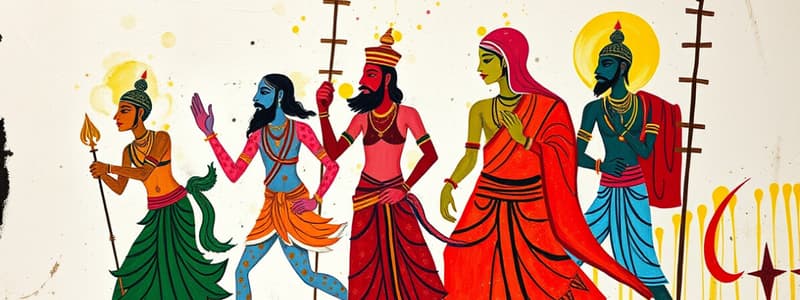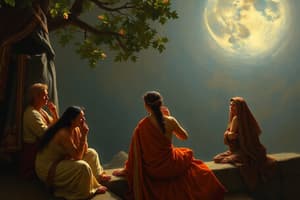Podcast
Questions and Answers
How can individuals move from one caste to another?
How can individuals move from one caste to another?
You really can't; it's almost impossible. One way to do it is through marriage.
In Hinduism, how is salvation earned?
In Hinduism, how is salvation earned?
By following the caste system.
How are Hinduism and Buddhism similar?
How are Hinduism and Buddhism similar?
Both originated in India and aimed for enlightenment.
What did Asoka accomplish during his rule?
What did Asoka accomplish during his rule?
What were the long-term effects of the caste system in India?
What were the long-term effects of the caste system in India?
What are yin and yang?
What are yin and yang?
Why did Chinese philosophies rise in China?
Why did Chinese philosophies rise in China?
What role did Indians play along the Silk Road?
What role did Indians play along the Silk Road?
What did the teachings of Confucius encourage people to do?
What did the teachings of Confucius encourage people to do?
What religion follows the Four Noble Truths?
What religion follows the Four Noble Truths?
What are the major beliefs of Confucianism?
What are the major beliefs of Confucianism?
How were bureaucrats chosen during the Han Dynasty?
How were bureaucrats chosen during the Han Dynasty?
What were the major accomplishments of the Gupta Empire?
What were the major accomplishments of the Gupta Empire?
What is karma?
What is karma?
Where is the Deccan Plateau?
Where is the Deccan Plateau?
What were the Aryans known for?
What were the Aryans known for?
What is the caste system?
What is the caste system?
Who were the untouchables?
Who were the untouchables?
Who was the founder of Buddhism?
Who was the founder of Buddhism?
What is the Dao?
What is the Dao?
What were the Analects?
What were the Analects?
Who was the founder of the Han Dynasty?
Who was the founder of the Han Dynasty?
What functions did the government in Han China have?
What functions did the government in Han China have?
What are similarities between Daoists and Confucianists?
What are similarities between Daoists and Confucianists?
What is a dynasty?
What is a dynasty?
How were the Mauryan and Gupta dynasties different?
How were the Mauryan and Gupta dynasties different?
How were Hinduism and Buddhism different?
How were Hinduism and Buddhism different?
What did Confucianism and Hinduism have in common?
What did Confucianism and Hinduism have in common?
Why was India more often invaded than China?
Why was India more often invaded than China?
How did Confucianism and Legalism deal with social disorder?
How did Confucianism and Legalism deal with social disorder?
How was Buddhism considered a religion for the general public?
How was Buddhism considered a religion for the general public?
Flashcards are hidden until you start studying
Study Notes
Caste System in Hinduism
- Movement between castes is nearly impossible; rare changes occur mostly through marriage.
- Salvation in Hinduism is attained by adhering to the caste system.
Hinduism and Buddhism
- Both religions originated in India and share the ultimate goal of enlightenment.
- Buddhism was founded by Siddhartha Gautama.
Historical Influences and Figures
- Asoka, a prominent Indian emperor, spread Buddhism during his reign.
- The Aryans established the caste system, which enforced social hierarchy and dominance in India.
- The Gupta Empire made significant accomplishments in stable village life, mathematics, astronomy, and medical knowledge.
Chinese Philosophies
- The rise of Chinese philosophies like Confucianism and Daoism was prompted by the need for order during the warring states period.
- Confucius emphasized moral conduct, respect for elders, and setting good examples in his teachings.
Government and Bureaucracy
- In Han China, bureaucrats were chosen based on civil service exams, moving away from Legalism in favor of Confucianism.
- The government focused on moral guidance and influencing civil behavior.
Key Philosophical Concepts
- Yin represents darkness and cold, while Yang symbolizes light and heat; balance between the two is essential for harmony.
- Karma is the result of one's actions, reflecting the sum of good and bad deeds.
Social Structures
- The caste system is a hierarchical division established by the Aryans, with the untouchables at its lowest tier.
- Confucianism and Hinduism both endorse social inequality and stress the value of social order.
Trade and Cultural Exchange
- Indians acted as middlemen on the Silk Road, facilitating trade and the exchange of goods between civilizations.
Similarities and Differences between Religions
- Hinduism adheres to the caste system and has multiple founders; Buddhism rejects it and promotes equality.
- Buddhism is seen as a general public religion with no strict requirements, resembling a way of life.
Geopolitical Factors
- India was more vulnerable to invasions than China due to its geographic proximity to other civilizations and weaker natural barriers.
Legacy of Dynasties
- Dynasties are defined as royal families that pass power through generations; notable dynasties include the Mauryan and Gupta, each with distinct founders and achievements.
Studying That Suits You
Use AI to generate personalized quizzes and flashcards to suit your learning preferences.




